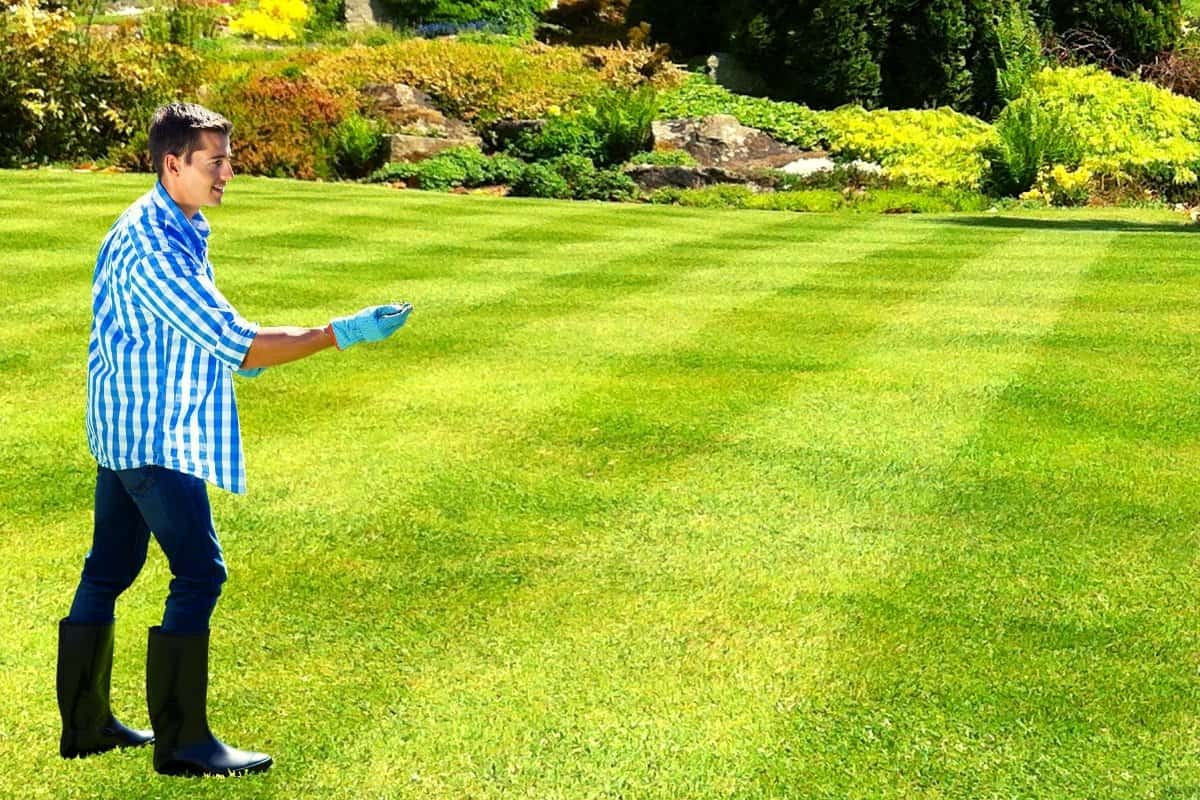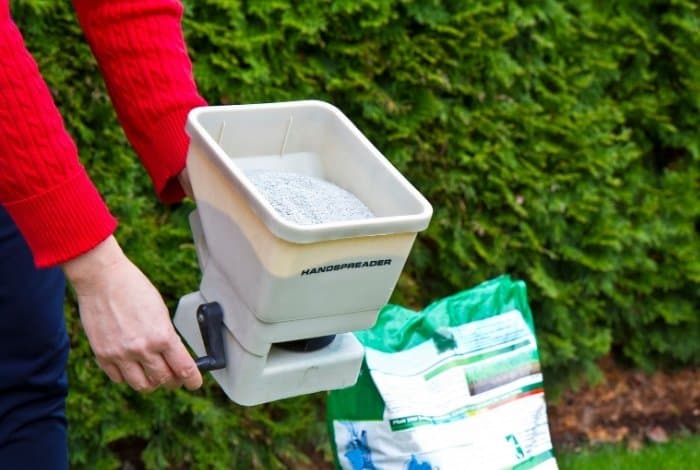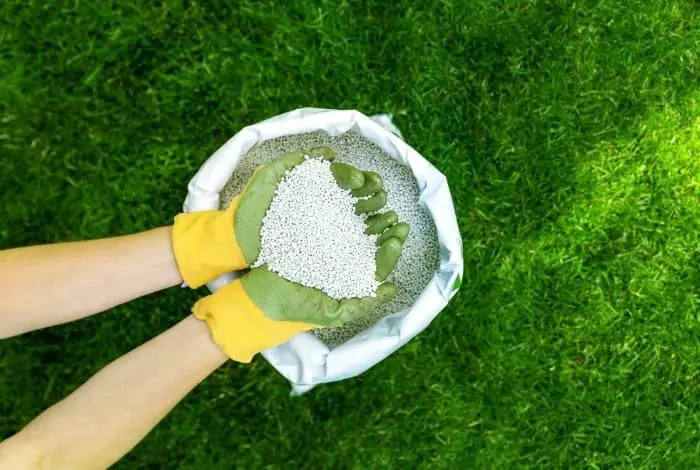Last Updated on January 31, 2023 by Griselda M.
What Exactly Are Weed and Feed Products?
So does weed and feed kill clovers? Before we answer this question, let’s look at what exactly are these products. Weed and feed products provide Nitrogen-rich fertilizer on the lawn. They are mixed with herbicides like the common Dicamba and 2, 4D. They kill broadleaf weeds by carrying the active ingredients from the leaf surfaces to the roots thus killing the whole plant. Both broadleaf and tender-leafed weeds including clover can succumb to any of these herbicides.
In these herbicide products, there are granular as well as weed and feed formulas that prevent weed seeds from germinating. The broadleaf weed and feed formulas are effective against most string weeds including clover.
Did You Know That Clovers Have Benefits for Your Lawn?
So Does Weed and Feed Kill Clover?
- Lack of enough weed-killing power. Most weed and feed products use the 2, 4 – D as their sole herbicide. This chemical will only kill dandelions but not control other weeds including clover, ground ivy, black medic, and bindweed. Other weed and feed products add Mecoprop which though useful still lacks Dicamba. Dicamba is a more powerful herbicide and is available to gardeners in broadleaf herbicide mixes. Please note Dicamba builds up in the soil and damage shrubs, perennials, and young trees. Limit the use of Dicamba to once per year with the best application time being late September.
Scotts Turf Builder Weed and Feed Clover Killer

- Herbicide granules may roll off the weed leaves before they are well absorbed. Lawn herbicides remain ineffective unless they are well absorbed by the leaves of the weeds. This is a problem, especially with the small-leaved weeds like black medic and clover.
- To help these weeds absorb the herbicide, you must water your lawn before you apply the weed and feed products. This helps the granules stick on the leaves better than when they are dry. To help with the granules sticking, you may also add a drop of detergent to the spray mix. If you have only a few weeds on your lawn, you don’t have to spray the entire lawn. You can carry out a spot treatment which is a better choice for the environment and saves you money.
Does Scotts Weed and Feed kill clover?
If you’re wondering “does Scotts weed and feed kill clover?” then let me explain. Weed and feed fertilizers usually contain 2,4-D as their herbicide. Although this chemical is effective in getting rid of plants like dandelions, weed control on the other hand is somewhat questionable. Bindweed, black medic, clover, and ground ivy are not easy to control if you don’t apply an effective herbicide.
However, when it comes to Scotts triple action turf builder, it is effective in preventing and killing weeds like clover, affording you a lush lawn. If you have existing lawn weeds, including plantain, henbit, ground ivy, and others, Scotts will nip the spread of them in the bud and control further growth. Scotts weed and feed are safe to use on Kentucky bluegrass, centipedegrass, Bermuda grass, zoysiagrass, fine fescue, bahiagrass, perennial ryegrass, and tall fescue.
The application is also quite easy and should be accompanied by a Scotts spreader for best results. If you want to cover a 4,000 square feet area, a 20-pound bag would be enough. Just remember that the application should be done on a wet lawn for the best results.
Will Clover Take over Grass?
So, will clover take over grass? The answer is yes and no, as it would heavily depend on the grass you’re growing and whether the soil is in favor of your lawn’s demands or the clover weed’s requirements to thrive. Untreated lawns that are not well-maintained can see an influx of thriving clover over the entire lawn. However, this can be easily rectified using a lawn-friendly herbicide to get rid of the weed.
However, clover also has its benefits that you should take note of. Although weed and feed control clover, did you know that these weeds are advantageous to thriving lawns? This is because clover can actually enhance the health of your grass as it creates its own fertilizer and adds nitrogen to the existing soil. So, the truth is that there are benefits and drawbacks to having clover on your lawn. If you opt to get rid of clover because you notice that it is taking over your grass, then there are several herbicides developed to kill lawn weeds.
Keep in mind that if you do see clover thriving it is most likely that the soil pH is incorrect, the grass is low growing, the nitrogen levels are low, or the soil is compacted. Seeing that this weed grows vigorously in direct sunlight, allowing the grass to grow taller by raising your mowing height will block the ray of the sun, which will flaw its growth.
What Will Kill Clover but Not Grass?
If you have bought the wrong product and are now wondering what will kill clover but not grass, we have a few suggestions for you. Using a recommended herbicide is advised because you will eliminate the risk of damaging your lawn that is surrounded by clover patches. For this, the tried and tested Advanced Development In Organic Solutions (A.D.I.O.S.), which is an organic herbicide, is best for weed control. This is because it gets rid of clover and other weeds without killing your lawn.
Here are a few benefits of using A.D.I.O.S:
- It is a non-toxic organic herbicide that is safe to use. This is especially true if you have pets or children who are fond of spending time in the garden.
- If your property is in an area that has water bodies nearby or is surrounded by livestock, there are no worries when using this product, as it is safe. It will not contaminate the water or harm livestock in any way.
- Garden invaders like poison ivy, ragweed, dandelion, yellow mustard, and other weeds would be under control or completely eliminated when using this natural herbicide.
- This product is easy to buy as it is widely sold online and at local home improvement stores and garden centers.
So, if you are after a non-toxic weed and feed herbicide to get rid of clover and other weeds, A.D.I.O.S is a great option.
Best Time to Spray Weed and Feed to Kills Clover
Late September is good for killing the weeds. This is a great time to kill weeds, especially after the first light frost. Now, the weeds are preparing for winter. This means they are sending their nutrients down to the roots to prepare for winter. If you spray the weeds in this season, they will take the herbicide along with the nutrients down to the roots. The entire plant including the root dies.
Late September is not a great time for feeding the lawn. The grass plants know that winter is coming so they stop growing new blades and begin to prepare for the frigid winter. A fertilizer application hinders this process by promoting new blade growth and delaying their hardening. This makes the lawn more vulnerable to winter injury.
Late October is best for feeding the lawn. This is after all the grass blades stop growing and you stop mowing. The application now is the most valuable for your lawn. You will not see any immediate reactions after the first application. But the fertilizer will develop a stronger root system that generates new blades in the spring. These roots continue growing until the ground froze in Mid-November.
Conclusion
FAQs
How long does weed and feed take to kill clover?
If you have a clover patch, then you may be wondering how long do weed and feed take to kill clover.
Initially, weed takes about two weeks to kill clover. But it can take up to five weeks of continuous exposure for a complete kill. Drying out the patch after weed application is recommended for complete kill.
What weed killer kills clover?
The best way to kill clover is with glyphosate. It's a weed killer that kills clover and other broadleaf plants. It comes in liquid, granular, and concentrate forms. The liquid form is the most popular because it is easier to use than the other forms.
How do I rid my lawn of clover?
You might want to remove clover from your lawn because it doesn't look good, smells bad, and can be a fire hazard. There are several ways you can kill clover in your lawn.
One way of killing clover is by using vinegar and salt. Just sprinkle some salt over the areas that have clover and then pour vinegar on top. This will make the surface of the soil wet and kill the living organisms in it.
If this doesn't work, you can use a weed killer to kill the plant's cells and roots.
What kills white clover in grass?
The most common killers of white clover are herbicides, especially glyphosate. It's not clear why glyphosate causes such a quick demise for white clover, but it's thought to be because the plant absorbs glyphosate into its leaves and stems and translocates it to growing points that give rise to new shoots. This causes death on the stem and sprout level.
What fertilizer will kill clover?
Clover is a weed that is also known as the lawn's best friend. It's great for mowing and keeps your lawn neat while growing well in most soils. But what if you want to kill it? Well, one fertilizer will do just that:
Just mix 2 parts of urea (a fertilizer) with 1 part of potassium chloride (KCl) and apply it to clover. The KCl will act as a poison, killing the clovers.
How do you kill clover and dandelions?
There is a lot of conflicting information about how to kill clover and dandelions. Some people recommend getting rid of these plants by following these steps:
*Wear gloves and grab the plant with your bare hands
*Use a weed killer, like glyphosate, to put down the plant
*Use an herbicide, like 2,4-D, to kill all plants on the weed killer's spray-line.
However, some people believe that these plants should be removed in different ways:
- destroy roots by chopping or mowing them away - wait for them to die naturally or dig them up and destroy their roots - remove them with a hoe - pull off leaves one by one so that they won't regrow.
Why is there so much white clover this year?
This year has seen a lot of white clover around the world, which is not a typical characteristic for this particular season. This has raised questions about what could be the cause of this unusual phenomenon.
In many areas of the US, plant hunters have been finding white clover that was previously unknown. This could be due to climate change or global warming, as it is believed that these white clovers are more resistant to cold temperatures and drought than its older counterparts.
Caroline is a gardener who loves to get down to the nitty–gritty of gardening. She proudly proclaims herself as a ‘dirt worshipper‘ and can often be found deep in the garden, covered in soil and singing to her plants. As a self–proclaimed ‘plant whisperer‘, Caroline believes that plants need love and attention just like any other living thing, and she loves to give them both. When she‘s not tending to her garden, you can often find her researching the latest gardening trends, or teaching others how to make their gardens thrive




